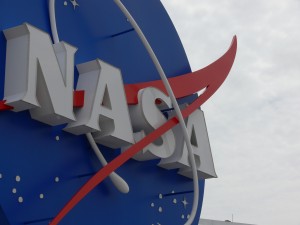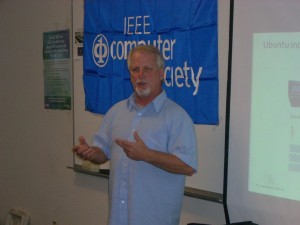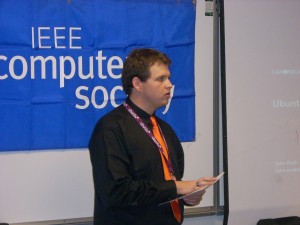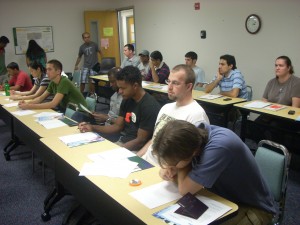The pain of proprietary
Monday, August 29th, 2011Some things come only with proprietary software.
Today, in a span of about twenty minutes, while I was waiting and walking and killing time in MSC (The Marshall Student Center), I overheard two separate people having issues with a Microsoft license key. The first case happened in the USF computer store: While I was inspecting one of the Macbook Air display models, a relatively angry young man marched into the store, straight up to the desk, complaining about having a non-functional Microsoft license key for (I forget which Microsoft product, but probably Office). As politely as he could, he asked for a refund, and the girl behind the counter tried to send him elsewhere to resolve his issue. He complained that he already had been elsewhere and elsewhere sent him back here. I didn’t stick around for his resolution. I left shaking my head.
The second incident, much more tragic than the first, happened in the campus bookstore. I overheard a girl speaking on a cell phone in desperate tones to who I can only assume is her significant other. She frantically recounted her experience the previous day, trying to install and/or activate her legally purchased copy of Microsoft Office. At one point in the installation process she needed a key, and she did not have one that worked. Evidently she either misplaced it or, like case study number one from the computer store, the key she was given did not function. In either case, she spoke about how she was up hours into the night, searching for a key, even trying her key that she had from another version (installed on another computer belonging to either her or a family member, I didn’t hear; I was trying to remain inconspicuous while listening!), trying to get the suite installed. She had a first-week assignment that she needed to complete, and, at this point almost to tears, she pled with the person on the other end of the phone to find her a key, or she would try to return the software and have to consider dropping the class.
I’ve been told a couple of times that people, in general and as a whole, do not care about things like software propriety, but I encountered two very unremarkable people today who I would bet cold money would say they were extremely inconvenienced by a form of DRM (Digital Restrictions Management; see here: http://www.defectivebydesign.org/what_is_drm) that only proprietary software would admit into existence. You see, free software is *not* concerned with charging customers a distribution fee, a point that free/libre software advocates iterate constantly. It is not about charging money or not charging money. It isn’t about the exchange of money at all. Free software is about the realization that users have rights, too. These two college students both purchased legitimate copies of Microsoft software, and let’s go ahead and assume liberally that they purchased the copies at deep academic discounts. What did they get in return? Well, as of approximately 4:00p.m. this afternoon, they had a hassle, a headache, stress, and possibly one less class they could complete this semester. They did not have a functional software suite of office applications. The DRM, in this case probably some kind of software activation scheme (http://en.wikipedia.org/wiki/Windows_Product_Activation), locked them out of their own legally purchased software.
This kind of occurrence would never happen with libre software, because with libre software, you’re given the ability and legal right to modify your software so that you can make your machine do what you want it to do. These two students today did not have the legal ability to make their computers do what they wanted them to do, even if they had had the requisite programming ability. We know they did not have that kind of knowledge, or else they would have bypassed their entire respective ordeals by downloading a cracked executable, a leaked VLK, or a keygen, things all declared illegal by the DMCA, unless, of course, they are law-abiding citizens.
You don’t have to go far to find stories like these. I remember a few months ago when a fellow researcher in my lab had to suspend his research for at least several days while our department haggled with a software vendor over the cost of renewing a license for a proprietary software suite. I experienced a similar issue one summer while visiting my family in the mountains of North Carolina, where we did not have an internet connection at our house. Microsoft Windows decided to deactivate itself that week, which can happen when you change hardware components of your computer. Deactivation is a fancy word for the Microsoft Windows “feature” whereby an upgrade in hardware can cause your operating system to stop functioning until you contact Microsoft to explain what you did to your computer and ask for another key. Remember, at this point you have already paid for the software license; you’re not reinstalling anything. Windows will just stop working and make you seek permission of Microsoft to continue using your own computer.
As a matter of fact, that was my turning point. Why should I have to ask permission of some company when I already acquired the software legally? Users never should have that hassle. You know who never has that kind of hassle? People who use unauthorized copies of software, or software illegally activated. Only the legitimate users are inconvenienced, an observation made over and over and over by the anti-DRM crowd (see any recent news story on DRM in PC games).
You know who else does not have to deal with software activation or DRM? Users of free software. There are some things that come only with proprietary software, and those things I would rather not have.






